

Nationwide ‘No Kings’ Protests Push Back on Trump’s Parade, Policies, and Power
BLACKPRESSUSA NEWSWIRE — From Bethesda, Maryland, to Atlanta, Georgia, across New York, Chicago, Los Angeles, Denver, and more than 2,000 other cities and towns nationwide, tens of thousands of Americans turned out Saturday in unified protest Donald Trump’s military parade
By Stacy M. Brown, NNPA Newswire Senior National Correspondent
From Bethesda, Maryland, to Atlanta, Georgia, across New York, Chicago, Los Angeles, Denver, and more than 2,000 other cities and towns nationwide, tens of thousands of Americans turned out Saturday in unified protest Donald Trump’s military parade, his 79th birthday, and what they described as his authoritarian leadership. In many cities, demonstrators carried signs and photos of former President Barack Obama — a visual rebuke of Trump, who has frequently lashed out at his predecessor. Some participants called Obama a symbol of the democratic ideals they believe Trump is working to dismantle.
The largest crowds gathered in major urban centers, where chants of “No Kings” rang out alongside “This is what democracy looks like.” In Philadelphia, where thousands marched from Love Park to the Philadelphia Museum of Art, Rep. Jamie Raskin of Maryland asked, “So what do you say, Philly? Are you ready to fight back? Do you want a gangster state, or do you want free speech in America?”
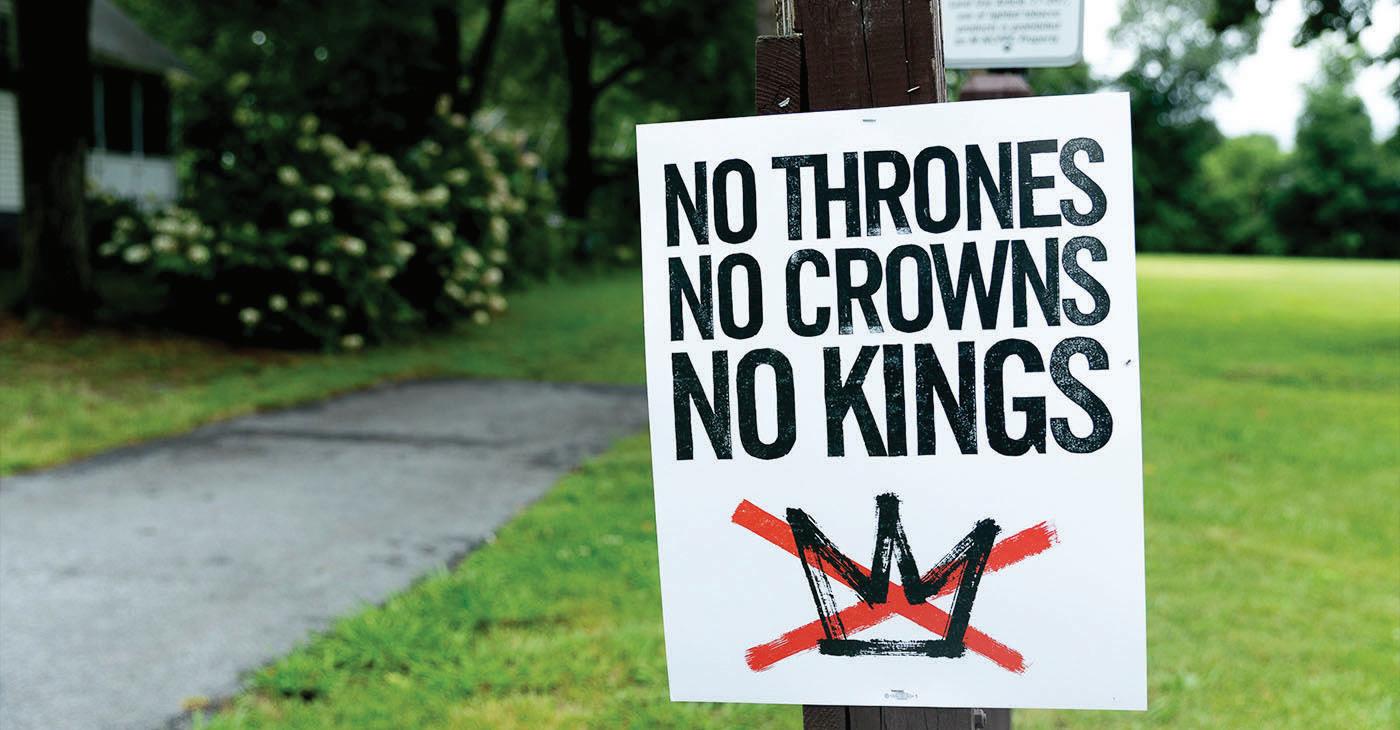
Atlanta’s Liberty Plaza reached its 5,000-person capacity early in the day. Thousands more lined the streets around the Georgia State Capitol holding placards and waving flags — many held upside down as a sign of national distress. In New York City, protesters filled Bryant Park, where organizers distributed “No Kings” posters and Obama portraits. Demonstrations stretched coast to coast, from Honolulu to Homer, Alaska. In Los Angeles, thousands more took to the streets following a week of tense standoffs between demonstrators and law enforcement. Elidia Buenrostro, 29, marched with her daughter, holding a sign that read “Families Belong Together,” explaining that she was protesting on behalf of her undocumented family members.
Protesters in Philadelphia included a 61-year-old nurse named Karen Van Trieste. “I
just feel like we need to defend our democracy,” she said, noting her concern about staffing cuts Trump made to the Centers for Disease Control and Prevention. Some marchers wore costumes inspired by popular culture. Jacqueline Sacrona attended a Michigan protest with her daughters dressed as characters from The Handmaid’s Tale, while in Philadelphia, Dennis Hannan wore a bedazzled Elvis Presley outfit and carried an American flag. “We’re here to downplay any other kings,” he said. The 50501 Movement,
which organized the protests under the slogan “50 states, 50 protests, one movement,” said the demonstrations were timed to coincide with Trump’s military parade in Washington, D.C., and to counter what the group described as “authoritarianism disguised as patriotism.”
In Washington, protesters carried a large banner through the streets reading, “Trump must go now.” Others held signs that read “No Kings,” “Dissent Is Patriotic,” and “Democracy, Not Dictatorship.” In Charlotte, police on bicycles blocked
demonstrators from moving through the downtown area. Protesters chanted, “Let us walk,” while helicopters flew overhead. In northern Atlanta, tear gas was deployed to prevent marchers from reaching Interstate 285. One journalist was detained. Mexican flags — symbols of solidarity during recent immigration raids — were also present at several demonstrations.
The day’s peaceful resistance was disrupted in Minnesota, where organizers canceled local protests after two Democratic
lawmakers and their spouses were targeted in deadly shootings in separate incidents early Saturday. Former Minnesota House Speaker Melissa Hortman and her husband, Mark, were killed in their Brooklyn Park home. Sen. John Hoffman and his wife, Yvette, were injured at their residence in Champlin, nine miles away. Gov. Tim Walz called it “a politically motivated assassination.” Authorities said the suspect posed as a police officer, carried “No Kings” flyers, and had writings referencing the victims and other public officials. Organizers emphasized that the “No Kings” movement remains committed to nonviolence. They urged participants to avoid confrontation with counterprotesters and to adhere to local safety protocols. In cities like Tallahassee, St. Louis, Providence, and Albuquerque, the message remained consistent: the country must reject authoritarianism. At the heart of the demonstrations were visible reminders of the president many see as a contrast to Trump. In dozens of cities, Obama’s image was lifted above the crowds — a silent but potent statement about the kind of leadership many Americans said they want to return to. “We are not loyal subjects,” a protester in Chicago told a local television station. “We are citizens of a democracy, and we’re not going to be ruled by a king.”
Tragedy in Minnesota: Former House Speaker Melissa Hortman Killed in Politically Motivated Attack
by MSR News Online
Minnesota’s political community is in shock following the targeted killings of Melissa Hortman, former Speaker of the Minnesota House, and her husband, Mark Hortman. Authorities believe the double homicide, which occurred early Saturday morning in the couple’s Brooklyn Park home, was politically motivated. The suspect, Vance Luther Boelter, 57, is also wanted in connection with the shooting of Senator John Hoffman and his wife, Yvette, at their home in Champlin. Governor Tim Walz called the incident a “devastating loss” and ordered flags across Minnesota to be flown at half-staff. “Melissa Hortman woke up every day determined to make our

re-elected

Speaker of the House Melissa Hortman addresses the house floor after being
during the first
Left to right: DFL House Leader Melissa Hortman, Senate Democratic Majority Leader Erin Murphy and DFL Gov. Tim Walz listen
Thursday, June 19, 2025
THE SAN BERNARDINO AMERICAN NEWS - COMMUNITY/EDUCATION

Sounds of Blackness Juneteenth Celebration Is An Anthem of Joy & Freedom for Our Time


In a powerful tribute to freedom and unity, Sounds of Blackness presents Juneteenth Celebration. Blending the rich traditions of R&B Soul with the contemporary flair of modern R&B, a music driven call-to-action that resonates with a vibrant spirit that invites listeners to celebrate heritage and resilience. The collective's signature sound is a heartfelt tapestry woven from the threads of gospel, soul, and funk, encapsulating the essence of the African American experience while pushing the boundaries of contemporary music.
Thematically, Juneteenth Celebration emerges as a jubilant expression of joy and reflection, marking a pivotal moment in history with vocal performances that echo the cries for freedom and the beauty of Black culture, the celebration of life, community, and the enduring spirit of those who fought for justice. With soulful melodies and uplifting lyrics, Juneteenth Celebration is designed to inspire and connect. The infusion of harmonies and rhythms captures the essence of a community coming together, with standout vocal performances that will have you moving and reflecting simultaneously.
About Sounds of Blackness: Founded in the heart of the vibrant Minneapolis music scene, Sounds of Blackness has long been recognized for their innovative sound and powerful messages. With multiple Grammy Awards and a legacy of soulful storytelling, their music transcends genres and generations. Influenced by the rich heritage of African American culture, they continue to inspire
Sounds of Blackness Juneteenth Celebration Is An Anthem of Joy & Freedom for Our Time..continued
audiences worldwide, making them an enduring force in the music industry.
Connect With Sounds of Blackness: Radio & Media Servicing Scott Herold rockstar@irockthecause.org
Garry Dennis Hines Musical Director gdennismusic@aol.com
Learn more at https://www.soundsofblackness.org/

Juneteenth 2025 in Leimert Park: A Celebration of Freedom, Culture, and Community
Historic Cultural Hub Hosts LA's Premier Juneteenth Festival with Music, Art, Wellness Programming, and Community Unity
Los Angeles, CA – On June 19th, the Leimert Park Village Merchants Association proudly presents what is widely regarded as the largest and most vibrant Juneteenth celebration in Los Angeles. This annual event honors the legacy of freedom and the enduring strength of Black culture and community in the heart of historic Leimert Park Village. Leimert Park Village has long been a cornerstone for Black art,
Juneteenth 2025 in Leimert Park: A Celebration of Freedom, Culture, and Community ..continued
music, business, and activism. This cultural landmark continues to be where generations gather to celebrate identity, resilience, and heritage. Hosting Juneteenth here carries deep significance—it serves as both a commemoration of emancipation and a living tribute to unity and progress.
"Hosting Juneteenth in Leimert Park is deeply meaningful for our community. It's a time for Black people to celebrate our culture, unity, and history—but it's also an invitation for all communities to come together in harmony. While many young people may not fully know the history of Juneteenth due to gaps in education, this celebration offers a powerful way to reconnect, honor our roots, and show the next generation the strength of the village. We welcome everyone to join us in this vibrant expression of culture, joy, and togetherness," said Queen Aminah, Head of the Leimert Village Association. Community Partnership and Support
City leadership has played a vital role in this year's success. Councilwoman Heather Hutt, representing Council District 10, has provided critical support, including permits, tents, tables, chairs, staging, and portable restrooms. In collaboration, the Leimert Park Village Merchants Association supplies sound systems and event security. The celebration will also feature a dedicated cooling area for elders and a VIP lounge at the Barbara Morrison Performing Arts Center.
Event Details and Programming
The celebration runs from 11:00 AM to 7:00 PM and features dynamic cultural programming and entertainment for all ages. The day begins with a Women's Drum Circle and Libation Ceremony, followed by performances from a 30-member jazz band, line dancing, and DJ sets. It culminates with a fashion show at Sole Folks at 5:00 PM. Health and Wellness Focus
A highlight of this year's celebration is the Wellness and Health Pavilion tent, organized and facilitated by Dr. Cherilyn Lee, who will serve as the lead speaker. Dr. Samuel Peters III will deliver the keynote address. Attendees can meet some of the community's top holistic practitioners, herbalists, and nutritionists. The pavilion will offer health screenings, mental health information, and comprehensive wellness resources.
Additional programming includes live Reggae and R&B performances and a curated art gallery exhibit to complete the festivities.
Sponsors and Community Support
The Leimert Park Village Merchants Association thanks the following sponsors for their support in celebrating community and unity: Queen Aminah Clothing, Nappily Apothecary, Neighbors Skate Shop, Sole Folks Community, Councilwoman Heather Hutt (CD 10), and the City of Los Angeles.
About Leimert Park Village: A historic cultural hub in Los Angeles, Leimert Park Village has served as a vital center for Black arts, culture, and community for decades, continuing to foster creativity, entrepreneurship, and cultural celebration.
For vendor participation and complete festival details, visit: https://www.juneteenthleimertparkmerchants.org/
Vendor inquiries: (805) 764-1919
For press inquiries, contact: jparris@richgirlproductions.com Mobile (323)251-1004 or (323)960-5600
Black History News
Black History News
Interview: Former Sen. Steven Bradford Explains Why He’s Running for Insurance Commissioner — Not Lieutenant Governor
By Edward Henderson | California Black Media

Former California Sen.
Steven Bradford (D- Inglewood) surprised some Sacramento political insiders late last Month when he withdrew his candidacy for Lieutenant Governor and announced his new campaign for State Insurance Commissioner. A longtime public servant, Bradford previously served in the California State Senate for eight years. Bradford – former chair of the Senate Energy, Utilities and Communications Committee — authored and championed laws covering a range of issues, including healthcare, public safety, energy, communications, education, economic development and revitalization. While in the Legislature, Bradford also served on the Insurance Committee, writing and supporting legislation aimed at making California’s insurance more equitable, accountable and accessible.
Bradford’s bid for Insurance Commissioner is happening at a time when there is increasing instability in California’s insurance sector. A number of insurers – including major providers like State Farm and Allstate – have exited the state or scaled back their coverage, citing the high cost of doing business in the state and overregulation
of the state’s insurance market. This trend has led to a shrinking private insurance market, particularly for homeowners in high-risk fire zones.
As a result, more Californians are signing up for the Fair Access to Insurance Requirements (FAIR) Plan, the state’s safety net insurance program for homeowners who can’t find fire insurance elsewhere. Enrollment in the FAIR Plan has surged, placing additional strain on the system and raising concerns about long-term sustainability.
Bradford has positioned himself as a reform-minded candidate focused on restoring stability to California’s insurance market. In a recent interview with California Black Media (CBM), he discussed the factors that led to his decision to run for Insurance Commissioner, his plans to address high insurance prices and his advocacy for racial equity and reparations.
You have raised more than half a million dollars for your candidacy for Lt. Governor since you announced in 2024. Then, late last month, you announced that you are running for State Insurance Commissioner instead.
What led you to make the switch?
It was a combination of things. The fire in Altadena and surrounding areas in Los Angeles and the Palisades was one. The number of calls that I’ve received from residents saying, “Hey, we’re in a crisis situation, Steve.” You have a skill set that we feel could bring folks together. You’ve demonstrated that as a utility chair, bringing in consumer groups, regulatory and the utilities companies themselves, having straight talk with these folks, and that’s what’s needed right now, trying to bring everybody together.’ I’m honored that they feel I have the skill set to do this.
It wasn’t an easy decision for me. It took a whole lot of conversation and even more prayer before I decided to go.
If you win the race for Insurance Commissioner, what would be the first thing you do to improve the relationship between the state and insurers and what would you do to persuade insurance companies with plans to leave the state to stay?
First, bring everybody in the room. You’ve got to have a good dialogue. You’ve got to understand what those challenges are that are driving them out and preventing them from providing insurance, and at the same time, finding out what are those pinch points for consumers where they say, “Hey, I can’t no longer afford this.” And I’m not going to sit here and say I have all the answers because it’s going to require me to surround myself with experts that know more than me. And far too often, you hear elected officials say what they’re going to do on day one. I’ve been elected long enough to know being elected does not come with a magic wand.
As more Insurance companies leave California, does the state have enough money to sustain the state-funded FAIR plan for homeowners?
It’s a challenge there; it’s about a billion dollars short right now.
There was a piece of legislation that was going through last year and I think they brought it back this year by I think Assemblymember Calderon who is trying to allow the fair plan to bond and raise funds if there’s a shortage. So, if that piece of legislation passes, it will help greatly in being able to monetize and pay for the program.
California has the highest insurance rates in the country. A lot of people in the communities we serve complain that insurance rates are too high and information about coverage is not straightforward and accessible enough. Do you have plans to dress these concerns?
That’s part of the whole discussion of bringing consumers into a room and bringing the industry into a room, understanding what those costs are, what’s driving those costs. But we’ve got to be honest about it. California has some of the most expensive real estate in the country — if not in the world. So, it’s going to cost more to insure it than it would, say, somewhere in Iowa.
When you were in the State Senate you served on the Reparations Task Force. In terms of policy, are you still engaged in advancing the recommendations the task force made to the Legislature?
Without a doubt. I’ve been talking to community groups. I just did an interview with a news agency last week. I’m constantly being asked what my opinion is and how I think things are going. There are some challenges there but we still have to keep moving forward and trying to stand up for some of those 115 recommendations in the reparations task force report. And one of the things I learned personally during that task force was what role insurance played after slavery and the fact that many Black folks couldn’t get insurance. So, it was part of the reparations discussion as well.
In a Time of Discord, Dr. Weber Says Civic Engagement Is Our Lifelong Duty
By Antonio Ray Harvey and Regina Wilson | California Black Media

by Antonio Ray Harvey CBM.
On June 12, California
Secretary of State Dr. Shirley Weber participated in the Public Policy Institute of California’s (PPIC) 2025 Speaker Series in Sacramento, where she joined a panel of civic leaders to discuss how to build stronger civic education and engagement systems across the state.
By week’s end — on June 14 — she stood before a hometown crowd in San Diego, launching her 2026 re-election campaign against a tense national backdrop: the violent murders of two Minnesota state officials, escalating political unrest, and a wave of coordinated protests across the country.
That morning, Americans woke to the shocking news that two state senators in another part of the country had been shot — one fatally — along with
her husband in what has been reported as politically motivated violence.
“My heart is very heavy this morning,” Weber told the crowd.
“At my age, I’ve seen so much — assassinations, uprisings, and civil unrest — but I thought we had learned. I thought we had grown. And yet, here we are.”
Despite the somber tone, the moment was also one of reflection and determination.
Her remarks echoed themes she had emphasized on June 12 during the PPIC event in Sacramento, moderated by Tani Cantil-Sakauye, president and CEO of PPIC. Panelists included Mark Baldassare, PPIC’s survey director; Assemblymember Jeff Gonzalez (R-Indio); and Presiding Justice Judith McConnell of California’s Fourth Appellate District.
“We’ve failed our young people,” Weber said. “This failure isn’t new. It’s generational. When people in their 40s and 50s don’t understand how their government works or why it matters, we see the results in today’s civic crisis.”
According to a June 2025 PPIC report, only 11% of California K–12 public schools rank civic engagement as a top educational priority — well behind basic academic instruction, life skills, and college prep.
Justice McConnell emphasized how that gap is most severe in low-income and rural areas.
“We spend time with teachers and administrators across the state who are trying to teach civics with almost no support,” McConnell said. “We show up any time we’re asked — because democracy depends on it.”
At the San Diego launch, Weber was introduced by former Assembly Speaker and Senate Pro Tem Toni Atkins, who is currently running for Governor in 2026. Atkins delivered an impassioned endorsement that framed Weber’s campaign as a fight to preserve core democratic values.
“We’re not just here to support a campaign,” Atkins said. “We’re here to defend a principle — one that is under threat like never before. In moments like these, we don’t retreat. We rise. And we rise with leaders like Dr. Shirley Weber.”
Atkins praised Weber’s
In a Time of Discord, Dr. Weber Says Civic Engagement Is Our Lifelong Duty...continued
60th anniversary of the Voting Rights Act of 1965 with a year-long campaign to educate Californians on the law’s history and the ongoing threats against it.
“This isn’t just a commemoration. It’s a defense,” she said. “We must remind the next generation that people sacrificed everything for the right to vote. And that sacrifice must never be forgotten or undone.”
Weber made it clear that her
campaign is not just about reelection, but about preserving the integrity of California’s democracy.
“This is not a moment. This is our life,” she said. “Defending voting rights, protecting access, and empowering our communities isn’t something we do once every four years. It’s something we do every single day.”
journey — from the daughter of Arkansas sharecroppers to California’s first African American Secretary of State — and her leadership in expanding voter access, protecting election integrity, and standing up to voter suppression.
“She is a trailblazer, a tireless public servant, and a fierce guardian of the ballot box,” Atkins said. “Her life and her leadership are exactly what this moment demands — principled, courageous, and unshakably committed to the people.”
Weber also shared deeply personal stories that shaped her civic identity, including how her parents — denied the right to vote in the Jim Crow South — opened their Los Angeles home as a polling place.
“My mother served pie and pound cake to voters in our living room,” she said. “That was her way of standing for democracy.”
Now, as Secretary of State, she said she’s fighting a constant stream of legal and political attacks aimed at undoing that legacy — from attempts to restrict vote-by-mail access to efforts to purge voter rolls and shorten voting windows.
“We’re fighting lawsuits every day,” Weber said. “And we will not back down — not when others gave so much to secure the rights we now have.”
She also announced that her office will commemorate the
Commentary: Black Leaders Are Standing with Immigrant Communities — Even If Media Coverage Doesn’t Show It
By Joe W. Bowers Jr. | California Black Media

Last week, when Pres. Donald Trump sent federal troops into Los Angeles and escalated ICE raids across Southern California, Assemblymember Tina McKinnor (D-Inglewood) didn’t stay silent. As chair of the Los Angeles County Legislative Delegation, she led more than 30 lawmakers in a Capitol press conference denouncing what she called “unconstitutional actions.”
“Mr. President, stop provoking fear and violence in L.A. County,” McKinnor said. “We are not your political punching bag. We are a strong people — we are good people, and we will not be bullied.” She urged calm, adding, “Remain peaceful. Peace is our power.”
Despite statements like these
— and others from Black elected officials across the state — a narrative persists that Black leaders have been quiet. But California’s Black lawmakers are speaking out forcefully, even if media coverage hasn’t kept pace.
Assemblymember Isaac Bryan (D-Ladera Heights), co-chair of the California Legislative Black Caucus (CLBC), has been one of the most vocal critics of ICE operations. “I wasn’t just watching videos on the timeline. I was out in the streets,” Bryan said at a June 10 Capitol press conference organized by the Latino, Black, and Diversity caucuses. “They’re showing up at our elementary schools, and they’re taking children. They’re harassing our community members.”
Senator Steven Bradford (D-Inglewood) attends the inauguration of Tony Thurmond as California Superintendent of Public Instruction on January 8, 2023, in Los Angeles, CA. Photo by Maxiam Elramisiy, California Black Media
California Secretary of State Dr. Shirley Weber speaks at the Public Policy Institute of California’s 2025 Speaker Series on June 12 in Sacramento. The panel focused on advancing civic education and engagement across the state. Photo
Assemblymember Tina McKinnor (D-Inglewood), Chair of the Los Angeles Legislative Delegation, speaks during a press conference at the State Capitol on June 9. She led her colleagues in the Legislature in response to actions by federal authorities to deploy the National Guard, following a wave of ICE raids and challenges to the authority of the Mayor of Los Angeles and Governor Newsom. Photo by Antonio Ray Harvey, California Black Media
Thursday, June 19, 2025
Medi-Cal Cuts Threaten Undocumented Immigrants’ Health
By Roxsy Lin
Amid statewide immigration crackdowns, undocumented immigrants now face another threat: losing their health care.
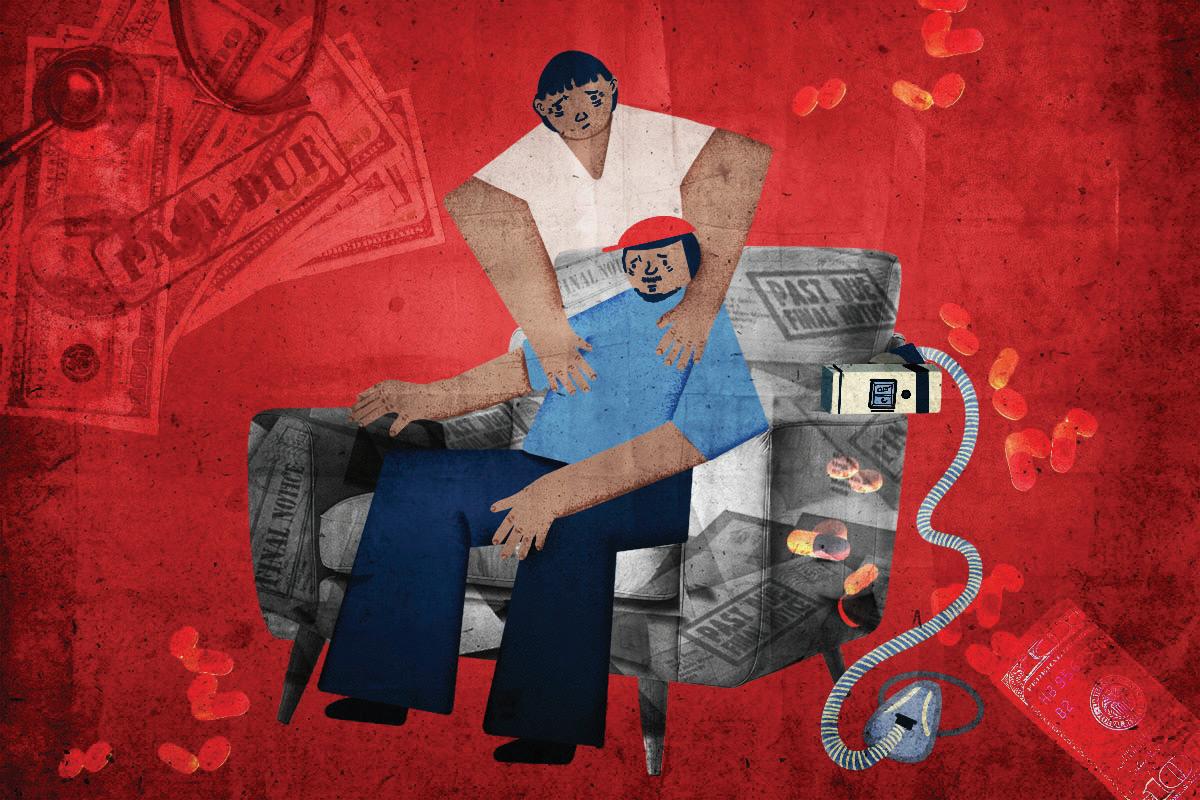
years,
Amid statewide immigration crackdowns, undocumented immigrants now face another threat: losing their health care.
Governor Gavin Newsom announced a proposal in midMay that would significantly change Medi-Cal access for undocumented immigrants aged 19 and older, starting in 2026. The plan includes a freeze on new enrollments, the introduction of a $100 monthly premium and the elimination of dental and longterm care coverage.
The measure, which is expected to save the government over $5 billion, must be included in the state budget and approved by the California Legislature before it can take effect.
For Daniela and her husband, Jose (we are not using their real names to protect their privacy) — both undocumented immigrants living in the U.S. over 30 years and currently residing in San Bernardino with their two children — Medi-Cal is a lifeline.
In 2018, Jose received a diagnosis of sleep apnea so severe that his oxygen levels dropped dangerously low, landing him in the hospital for two weeks.
For a year after his discharge, he had to use an in-home oxygen concentrator at all times.
During that time, Medi-Cal made it possible for the couple to access specialists, medications, essential equipment maintenance and a weekly home visit from a nurse for checkups on Jose’s recovery — care that would have
been out of reach otherwise.
That support didn’t end with Jose’s recovery.
Today, he depends on a CPAP machine to breathe properly while sleeping at night, and during daytime naps. The machine, vital to his health, requires regular maintenance including monthly filter changes and replacement of hoses and masks.
Medi-Cal continues to cover these ongoing expenses — in addition to regular doctor checkups and medications to manage his high blood pressure, diabetes and cholesterol — easing an otherwise insurmountable financial burden for the family.
If the upkeep of Jose’s CPAP machine were unaffordable and the device were to stop working due to a lack of maintenance, for instance, it could compromise his breathing, putting his life in danger and undoing years of progress in his recovery.
“God keeps me alive with this machine right now,” said José in Spanish. “We have to live with what God lends us, but if he lends us things and they want to take them away, what are we going to do?”
When asked about the possibility of having to pay a $100 monthly premium each, the couple didn’t hesitate to share their concern.
“We couldn’t afford it. We either eat or we pay, because it’s
too much to pay $200 a month,” said Daniela.
Jose added that just keeping up with rent and utilities is already a struggle, and if required to pay the premium, they “would have to go without Medi-Cal.”
“For many, a hundred dollars might not seem like much,” said Luz Gallegos, executive director of TODEC, in Spanish.
She explained that for families living paycheck to paycheck, every penny counts — that $100 can provide a week’s worth of groceries, a tank of gas or a crucial part of their rent.
For farmworkers and other immigrant laborers performing tough jobs in extreme conditions for the lowest wages, this amount is not just a number; it can mean survival, continued Gallegos.
“Economic and community well-being must go hand in hand,” she said. “Without healthy men and women, we will not have a healthy economy.”
Mireya Suarez, a community organizer at CHIRLA in San Bernardino, believes that the most effective approach to healthcare involves investing in prevention instead of waiting for conditions to worsen.
“It will always be much cheaper for the state to prevent chronic diseases instead of providing care when the person already has a chronic disease, which will last for a long time,” she said in Spanish.
A single emergency room visit can cost the government thousands of dollars — far more than a routine check-up or preventive treatment.
Gallegos has observed this dynamic at play, as TODEC has documented cases of patients who have gone to the ER only when their illnesses are already very advanced, or when about to die.
“We have serious cases of people whose diabetes wasn’t detected in time, and they end up blind. Imagine that — men we know who have gone blind at 30, 33, another one at 40-something years old,” she said.
“These are young men who were working in the fields and
started to feel sick, and there was no other option,” Gallegos continued. “They were taken to the emergency room, and by then, their diabetes was already very advanced.”
Another health condition that Jose must manage is hyperuricemia, an excess of uric acid in the blood that causes severe swelling in his feet, knees, hands and fingers, often making it nearly impossible for him to stand or walk.
Before the couple had MediCal, flare-ups would leave him bedridden for weeks. Without any affordable treatment available, they had to rely on friends traveling to Mexico to bring back just enough medication to ease his symptoms for a few days — barely enough to get him back to work and provide for Daniela and their two young children.
Now, with Medi-Cal, as soon as Jose begins to feel the early symptoms of a flare-up, he seeks immediate attention, preventing the swelling from immobilizing him and wreaking long-term damage to his joints.
With looming statewide cuts, those benefits could be put in jeopardy.
In Gallegos’ opinion, it is not the time to restrict access, but rather to expand it.
In her day-to-day work on the ground, she witnesses the harsh reality that many immigrant families, especially undocumented workers, are facing more than ever.
They live in fear, she described, and without the mental health resources they desperately need, depression can take hold.
With anti-immigrant rhetoric escalating at the federal level, meanwhile, the consequences have been devastating.
“We’ve recently documented several suicide cases, particularly among men,” said Gallagos. “Imagine living with this situation and not having access to health care.”
For her, this is a critical moment for the state to stand firmly with the community and offer real, sustained support.
Redirecting Penalty Revenues: Covered California Steps Up Services for Lower Income Enrollees
By McKenzie Jackson | California Black Media

Covered California Chief Medical Officer Dr. Monica Soni at the African American Male Wellness Walk discussing health care issues, including health equity and the need for coverage and care within the African American community.
Covered California is channeling $15 million from underperforming health insurance plans into a new initiative aimed at improving the health and well-being of some of its members.
The Population Health Investments (PopHI) program supports low-income families with grocery assistance, boosts childhood immunization and well-child visit rates, and helps families invest in their children’s educational futures. It also strengthens primary care practices that serve Covered California and Medi-Cal enrollees by enhancing their population health management capabilities.
Dr. Monica Soni, Chief Medical Officer at Covered California, said the goal is to improve health outcomes and reduce disparities among enrollees.
“We often think of health as something that happens inside a clinic or hospital,” Soni said. “But in reality, most of what determines health happens outside those walls. We’re thrilled to bring these investments to life.”
The three-part initiative — also known as Beyond California — includes the Grocery Support Program, the Child Savings Account Program, and an Equity
and Practice Transformation infrastructure project developed by the Department of Health Care Services.
PopHI is funded through the Quality Transformation Initiative, a performancebased accountability program that incentivizes the 13 health plans in the Covered California marketplace to meet benchmarks in areas like blood pressure and diabetes control, colorectal cancer screenings, and childhood immunizations. In 2023, 11 plans failed to meet those benchmarks and were penalized with fines.
“Our goal isn’t to collect money,” Soni said. “It’s to ensure that all Covered California enrollees — and all Californians — achieve the health and wellness they deserve.”
Launched in February, the Grocery Support Program will distribute $11 million to 13,000 enrollees and 7,000 households this year. Participants — who must have chronic conditions such as asthma, diabetes, or hypertension and report food insecurity — receive at least $80 per month on a reloadable debit card to purchase fresh food, packaged goods, baby food, and non-alcoholic beverages. Eligible households must earn no more than 250% of the federal poverty level.
“It’s hard to manage a chronic condition when you’re worried about your next meal,” Soni
WITNESS FOR JUSTICE Issue #1259 Soft Power
Shari Prestemon
“Is a foreign aid program really necessary? Why should we not lay down this burden…? The answer is that there is no escaping our obligations: our moral obligations as a wise leader and good neighbor … To fail to meet those obligations now would be disastrous...”
President John F. Kennedy, March 1961
Special Message to the Congress on Foreign Aid
The opening question that President Kennedy posed to Congress in 1961 was a provocative one, but it was just the start of a longer argument he would make. In fact, he was thoroughly convinced that foreign aid from the United States to “less developed nations” was vitally important. Congress ultimately agreed with him. Thus began USAID, the US Agency for International Development.
Two decades later, a political scientist at Harvard, Joseph Nye, would refer to such aid from the United States as an element of “soft power.” Soft power is the idea that promoting values like human rights, democracy, and peace by investing in countries that are economically and politically fragile can bear more fruit in the long term than the use of military might or economic sanctions. The careful cultivation of relationships through diplomacy, and aid that enables a country to overcome its biggest obstacles to stability, has its own unique power.
Today, the United States is all but abandoning the use of such soft power. Budget cuts to the State Department have disrupted diplomatic efforts; the closure of many embassies and consulates around the world is proposed. USAID, which represented a mere 1.2% of total federal spending, has been nearly eliminated by the Trump administration’s Department of Government Efficiency (DOGE).
The consequences of these cuts are devastating for many around the world. Critical health care for pregnant women, vulnerable newborns, and persons living with HIV will end. Feeding programs for the severely malnourished will stall. Humanitarian responses to places reeling from natural disasters and violent conflicts will diminish. Our investments in the things that make for peace are being eviscerated. As a person of faith, the callousness of these decisions makes me ill. I cannot comprehend such a complete lack of compassion, the utter dismissal of any positive contribution to the well-being of others around the world. Many of our elected leaders love to trot out the Bible when it’s convenient and fling claims of faith when they believe it will serve their political futures. But these decisions bear no resemblance to faith-informed leadership.
The Christian faith demands compassion and generosity. Jesus commanded us to love our neighbor and demonstrated that our neighbor is not simply the person that is like us or near us but is in fact the stranger, the foreigner, the suffering. He made it clear that God’s favor rests with those who see another’s need and meet it, while God’s judgment is reserved for those who don’t: “for I was hungry and you gave me food, I was thirsty and you gave me something to drink, I was a stranger and you welcomed me, I was naked and you gave me clothing, I was sick and you took care of me, I was in prison and you visited me” (Matthew 25:35–36, NRSVUE).
Authentic Christianity is rooted in our own version of “soft power.” It moves us to invest in people and build relationships. It recognizes empathy as a strength and virtue. It extends extravagant love and uncommon mercy. It desires justice and peace for all. It does not grow weary in doing what is right.
President Kennedy was correct in 1961. Our country has a moral obligation to be a wise leader and good neighbor in the world. Failing to meet that obligation now is disastrous for us all.
Global Ministries has 250 partners in nearly 90 countries around the world. Read about the impacts of current U.S. foreign policy and cuts to USAID on our partners here.
https://www.globalministries.org/current-impacts-of-key=9b2166 d17a839c11162c3da8c0542a831b0a3f0fd3ee5d9b43fb34c661349 8d7key=9b2166d17a839c11162c3da8c0542a831b0a3f0fd3ee5d9b 43fb34c6613498d7
CDC warns of Salmonella outbreak linked to pistachio cream
said. “Food insecurity makes it nearly impossible to maintain good health.”
The Child Savings Account Program, launched in March, deposits up to $1,000 into CalKIDS savings accounts for 272 children under age two who are Covered California members. The funds are tied to the completion of well-child visits and vaccinations, encouraging preventive care while supporting future educational expenses.
“Every parent or caregiver is hopeful about their child’s future,” Soni said. “There’s a clear link between good health and educational opportunity. This program supports both.”
In addition, 46 primary care practices across California received a $2 million investment to enhance data integration, access expert support, and participate in virtual learning and peer engagement to leverage Equity and Practice Transformation infrastructure.
Covered California plans to expand the Child Savings Account Program as it evaluates PopHI’s overall impact.
“We’ve never done anything like this before,” Soni said.
“We’re moving millions of dollars from underperforming health plans back into the hands of our enrollees. As we plan for 2026, we want to learn what’s working and what more is needed.”
Health News
A CDC food safety alert regarding a multistate outbreak of Salmonella infections has been posted: https://www.cdc. gov/salmonella/outbreaks/ pistachiocream-06-25/index. html
Key Points:
Four people in two states have gotten sick with the same strain of Salmonella that has been linked to pistachio cream. One person has been hospitalized, and no deaths have been reported.
Do not eat, sell, or serve Emekbrand pistachio cream with a useby date of October 19, 2026.
Emek-brand pistachio cream is a shelf-stable nut butter cream sold online for wholesale distributors, restaurants, and food service locations nationwide.
FDA is working to determine if this lot is in distribution or if other lots or products are affected.
What You Should Do: Call your healthcare provider if you have any severe Salmonella symptoms after eating pistachio cream.
What Businesses Should Do:
Do not sell, serve, or distribute Emek-brand pistachio cream with the production code and
date below:
Use-by date of October 19, 2026
Production code (PNO): 241019
Wash and sanitize items and surfaces that may have come in contact with the pistachio cream. Follow FDA’s safe handling and cleaning recommendations when cleaning and sanitizing surfaces and containers that may have come into contact with products to reduce the risk of cross-contamination.
About Salmonella:
Most people infected with Salmonella develop diarrhea, fever, and stomach cramps 6 hours to 6 days after being exposed to the bacteria. The illness usually lasts 4 to 7 days, and most people recover without treatment.
In some people, the illness may be so severe that the patient is hospitalized.
Children younger than 5, adults 65 and older, and people with weakened immune systems are more likely to have severe illness.
If you have questions about cases in a particular state, please call that state’s health department.
For Daniela and her husband, Jose, undocumented immigrants living in the U.S. over 30
Medi-Cal is a lifeline. (Art by Roxsy Lin)
‘Arrogant, Dangerous, Dishonest’: Trump’s Global Image Tanks as U.S.
Reputation Plummets
By Stacy M. Brown, NNPA Newswire Senior National Correspondent
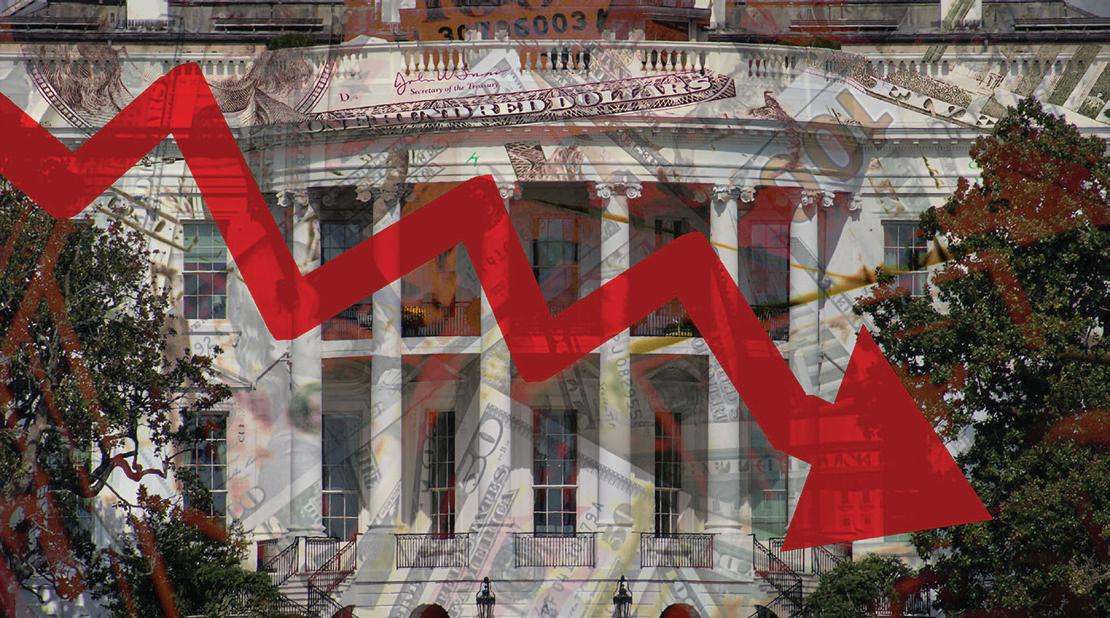
As Donald Trump settles into his second term as president, a blistering new Pew Research Center survey reveals that much of the world sees him as a dangerous and arrogant leader unfit to handle global challenges—and it’s dragging down America’s image abroad. From Europe to Latin America and across Asia, confidence in Trump to “do the right thing” in world affairs remains deeply underwater. In 19 of 24 countries surveyed, the majority expressed little or no confidence in him. A global median of just 34% have confidence in Trump, while 62% say they do not. Trump’s worst ratings come from Mexico, where a mere 8% express confidence and 91% reject his leadership. The damage extends far beyond personal opinion. The United States itself has taken a reputational hit. Favorable views of the U.S. have dropped in 15 countries since last year, with support plunging 32 points in Mexico and 20 points in Canada. Sweden now gives the U.S. its worst rating—79% view the country unfavorably.
The survey, conducted between January and April 2025 and released on June 11, paints a portrait of global mistrust. Trump earns dismal ratings on nearly every major international issue, from climate change and immigration to the RussiaUkraine war and U.S.-China relations. A median of only 24% have confidence in his ability to handle climate change, and just 33% trust him on Ukraine. Even among those who acknowledge his strength as a leader—a trait that a median of 67%
worldwide attributes to him— many still find him unqualified for the role. Majorities in most countries describe Trump as “arrogant” (median 80%) and “dangerous” (median 65%), while only 28% believe he is honest. The ideological divide is eye-popping. In countries like Israel, 93% of those on the political right trust Trump, compared to just 21% on the left. His support is also high among backers of populist parties, from Bolsonaro’s Liberal Party in Brazil to Netanyahu’s Likud in Israel and Milei’s La Libertad Avanza in Argentina.
Despite these pockets of support, comparisons to other world leaders reveal that Trump lags. French President Emmanuel Macron commands a global median confidence rating of 46%, compared to Trump’s 34%.
Russian President Vladimir Putin and Chinese President Xi Jinping fare even worse—but in countries like Mexico, Indonesia, and Turkey, more people trust Putin over Trump. The United States, once seen as a beacon of stability, is now viewed with ambivalence. Just 50% of people across 24 countries say democracy in the U.S. works well. Roughly half of those surveyed view the country as the world’s top economy, but partisan division and Trump’s leadership style have clouded its global standing. As the world watches Washington, the numbers don’t lie: Trump’s return to power hasn’t sparked a wave of renewed global confidence. Instead, it’s provoking a chorus of concern—and, in many nations, outright rejection.

“standard plan program” adopted by Los Angeles County for the Altadena One Stop Permitting Center. This allows for a simplified path through permitting.

and
Under this new partnership, San
Thursday, June 19, 2025
A Mother's Plea: The Urgent Need for
Productive Conversations About Gun Violence
By Julvonnia McDowell
When I bought my 14-yearold son a crisp, navy suit with a yellow bowtie for his upcoming spring formal, I never imagined that I'd have to bury him in it just days later.
My radiant, joyful boy went over to a family member's house, where he and his cousin found an unsecured gun in a drawer, hidden beneath a t-shirt. They started playing with it, not realizing it was loaded. Minutes later, JaJuan was gone.
The phone call we received that afternoon was every parent's worst nightmare. And it was entirely preventable.
My husband and I had always been protective of JaJuan. We'd taught him as a child to look both ways before crossing the street and not to accept rides from strangers. And we'd always ask other parents the usual questions -- about screen time, video games, and curfews -- before letting JaJuan go to a friend's house.
But we never asked: Is there a gun in the house? If so, is it stored securely? It never occurred to us that the thing that posed the greatest risk to JaJuan's life would be a firearm. But gun injuries are the leading cause of death for children and teens in the United States.
One of the things I've realized since my son passed away is that addressing gun violence and its impact -- especially on children -- doesn't have to be a partisan issue. With our children and teens at the center of this crisis, it can't be. A recent study from Johns Hopkins showed that gun injuries claimed over 2,500 children's lives in 2022 -- more than car crashes, overdoses, or cancers.
Whether you're a lifelong gun owner or someone who has never touched one, we all want our children to be safe, including reducing suicides and unintentional shootings -- which in 2022 accounted for nearly
60% of all gun deaths.
To save lives, we need a cultural shift. That starts with conversations that help people understand how asking simple questions, practicing secure storage and understanding the signs of a mental health crisis can prevent irreversible loss.
For starters, ask other parents, friends, and relatives if they keep firearms and how they're stored. It might feel awkward at first. But just like you'd ask about peanuts if your child has an allergy, asking about guns could save a life.
Similarly, parents -- even the ones who don't own guns -need to talk to their kids about firearm safety. Make sure kids understand that guns aren't toys.
We also need to normalize open conversations around mental health. This is especially important when it comes to putting necessary time and space between a teen in a moment of crisis and a firearm.
And >8 in 10 Americans agree that productive conversations can help reduce gun injury and death among children and teens.
Sharing JaJuan's story could help save another family from going through what we did. Talking about secure storage and crisis intervention doesn't have to be controversial. It just has to be done.
Start those lifesaving conversations today. And for those who don't know where to begin, information and resources to help start the conversation are available. We can all agree that we can all play a role in creating a safer America where gun violence is no longer the leading cause of death for children and teens.
Julvonnia McDowell is the mother of a son who died from an unintentional shooting and is an advocate for secure gun storage. This piece originally ran in USA Today.
Partnership Accelerates Home Rebuilding in Eaton Fire Area...continued

Commentary: Black Leaders Are Standing with Immigrant Communities — Even If Media Coverage Doesn’t Show It..continued from page 3
Bryan, who represents parts of South Los Angeles and Culver City, called out ICE activity at car washes in his district and condemned the use of federal force against protesters. “Los Angeles is the home of Black and Brown solidarity,” he said. “If you attack one vulnerable community in Los Angeles, you have attacked all communities in Los Angeles, and we stand up together.”
State Superintendent of Public Instruction Tony Thurmond, a member of both the CLBC and the California Latino legislative Caucus (CLLC), warned about the impact on students and families.
“One in five of our students in this state has an immigrant parent,” Thurmond said. “Who sends ICE to a community to detain a nineyear-old? Never thought we’d see anything like this in our lifetime.”
Assemblymember Mia Bonta (D-Oakland), also a member of both caucuses, said families deserve to feel safe — not targeted.
“ICE raids and presence in our neighborhoods are threatening our safety in the workplace, schools, and places of worship, breaking apart families and disrupting commerce,” she said. “We will not be silent.”
Assemblymember Sade Elhawary (D-Los Angeles), whose district includes part of downtown Los Angeles, also spoke at the press conference. Like Thurmond and Bonta, she’s a member of both the Black and Latino caucuses.
“When communities are demonized, when the humanity of our fellow human beings is questioned and denied … hope will never be silent,” Elhawary said.
She condemned the unapproved ICE operations near Exposition Park in her district. “No one at the state level approved the recent ICE activity,” she said. “This was not a joint operation. This was abuse of power.”
State Controller Malia M. Cohen echoed that sentiment. “What happened to David Huerta is a disgrace — not just an attack on one man, but an attack on all of us who believe in justice, dignity, and the right to speak truth to power,” she said.
When U.S. Senator Alex Padilla was tackled and removed from a Los Angeles press conference led by Homeland Security Secretary Kristi Noem, Black leaders raised their voices again. Bryan posted, “Authoritarians and dictators arrest political dissent… this is not America.”
State Sen. Akilah Weber Pierson (D-San Diego), chair of the CLBC, said, “What happened to Sen. Alex Padilla today is unacceptable… Silencing dissent
through intimidation and force sets a dangerous precedent that undermines the very fabric of our democratic values.”
Gov. Gavin Newsom has emphasized that California never requested federal troops and has challenged Trump’s deployment order in court. A federal judge sided with California in a preliminary ruling, but the Trump administration appealed. A hearing is scheduled for June 17.
From Inglewood to Oakland, Culver City to San Diego, Black leaders have been unified in denouncing the ICE raids, arrests, and Trump’s military interventions. But their voices haven’t gotten the media attention they deserve, leading some to wrongly assume they aren’t engaged.
And it’s not just elected officials. Black labor organizers, clergy, and community leaders have also condemned the ICE raids and arrests, standing in coalition with immigrant rights groups on the ground.
That lack of visibility is fueling confusion. Some Black Californians have questioned whether this is “our issue.” But what’s happening isn’t only about immigration. It’s about militarizing neighborhoods, tearing families apart, bypassing due process, and weaponizing fear.
There’s a long history of Black and Latino communities in California joining together — from United Farm Workers and Black labor alliances to the ethnic studies student protests in the 1960s and ‘70s, the fight against Prop 187 in the 1990s and the Black Lives Matters marches of the 2000s. History shows that when civil rights are stripped from one group, others are rarely far behind. Black Californians know these patterns. We’ve lived them. That’s exactly why Black leaders are speaking out.
This is not just a Latino issue. It’s a human rights issue. It’s a civil rights issue. And it’s a California issue.
Let’s not let selective media coverage cloud the truth. Let’s not allow anyone to divide us. And let’s remember protecting each other’s rights is the surest way to protect our own.
Because if they can do this to Los Angeles, they can do it anywhere.
This commentary highlights just a few examples of the actions taken by Black leaders. Many others have also spoken out against the ICE raids, the treatment of Senator Padilla and lawful protesters, and the arrest of SEIU President David Huerta.

Hello all,
Angeles County Supervisor Kathryn Barger, President of The Foothill Catalog Foundation Alex Athenson, CEO of San Gabriel Valley Habitat for Humanity Bryan Wong, and Eaton Fire survivors and property owners Kenneth and Carol Wood.
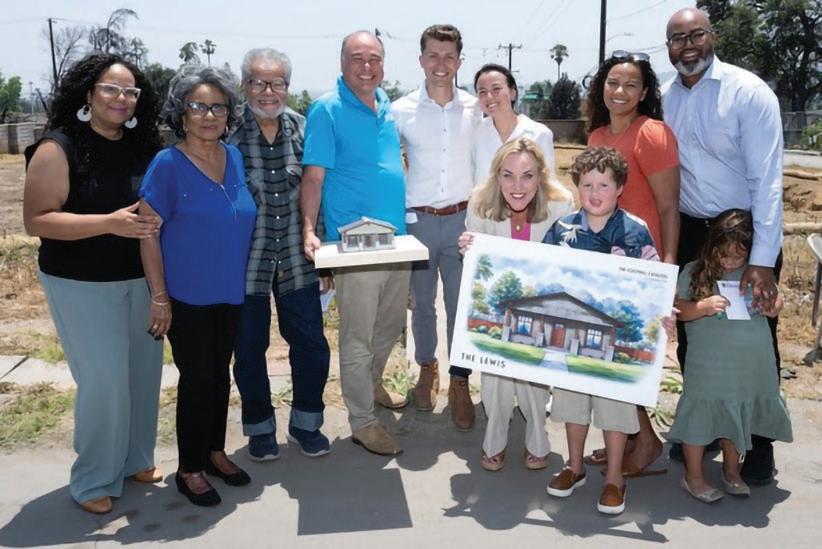
San Gabriel Valley Habitat for Humanity is assisting wildfire survivors in multiple ways.
San Gabriel Valley Habitat for Humanity and Habitat LA have launched ReBUILD LA, a long-term emergency response campaign to assist people with limited means to rebuild their homes, relocate to other housing, provide essential supplies, and restore their lives.
Whether a property owner is pursuing these programs or choosing other paths to rebuilding, One Stop Permitting Centers are available to assist.
families. On Friday, June 13, the launch of this partnership between the County of Los Angeles, the Foothill Catalog Foundation, and San Gabriel Valley Habitat for Humanity was celebrated by
Late last week, the City Attorney directed LAHD to not renew its five-year contract with Stay Housed LA, the largest legal services/homelessness prevention group of community based organizations in our region. Their current contract will end in 18 days without renewal. If it's not renewed, the impact will be catastrophic for those that need legal services to prevent housing loss, as well as the hundreds of people at CBOs whose jobs are funded by this contract.
We need to act IMMEDIATELY to urge Council to exercise its authority to renew Stay Housed LA’s contract and protect the crucial tenant protection services Stay Housed LA provides. Please click the link below to do so before tomorrow’s City Council Meeting. Click here to automatically email LA City Council today! https:// ujoin.co/campaigns/3880/actions/public?action_id=5611
Why is Stay Housed LA so important to Housing Justice?
Stay Housed LA has been implementing rental assistance, eviction defense, homelessness prevention, and tenant outreach and education activities for the City for the past four years. In these last four years, Stay Housed LA has provided full scope representation to over 4,200 tenants and limited legal services to over 15,000 tenants, keeping Angelenos in their homes. Without the Stay Housed LA renewal, there could be NO NEW services provided to people facing eviction, illegal rent increases, and other actions that threaten people’s housing. There would be NO access to critical rental assistance payments that keep people housed. There would be NO tenant education and outreach services, reaching those most in need across the City and providing additional support to those most impacted by the immigration raids. In times like these, we need to ensure that resources are being used to protect ALL Angelenos and Stay Housed LA is crucial in doing so.
Best, Arianna Bankler-Jukes Advocacy Director SCANPH
Presidential Approval Rating and The Economy (Photo by Douglas Rissing)
The Foothill Catalog Foundation is a local nonprofit organization dedicated to rebuilding
restoring communities affected by the 2025 Los Angeles wildfires.
Critics Question 2024 Results as Musk Tactics Surface
By Stacy M. Brown

Donald Trump’s return to the White House in 2024 has reignited questions about election integrity, particularly after his remarks thanking Elon Musk for what he called a “landslide” win in Pennsylvania. “He knows those computers better than anybody… all those vote-counting computers,” Trump said. “So, thank you to Elon.” The comment set off alarm, including Texas Rep. Jasmine Crockett. “So, Trump is rambling on about he and Elon rigging the election?! Am I missing something or is he confessing to yet another damn crime?!” she posted on social media.
Now, a Wisconsin nonprofit has filed a legal complaint accusing Musk, his America PAC, and a Muskaffiliated group called United States of America Inc. of violating state election laws by bribing voters. The Wisconsin Democracy Campaign and two voters allege Musk handed out $1 million checks and that his PAC paid $100 to registered voters who signed petitions and gave their contact information. Wisconsin law prohibits offering anything of value over $1 to encourage someone to vote. The complaint also cites violations of the state’s lottery ban. The plaintiffs are asking a court to declare the actions illegal, prevent future violations, and award

damages if applicable. The lawsuit follows a failed attempt by Wisconsin Attorney General Josh Kaul to block Musk’s actions earlier this year. Kaul argued that Musk’s conduct amounted to illegal inducement, but courts declined to intervene before the April state Supreme Court election. Jeff Mandell, president and general counsel for Law Forward, which represents the plaintiffs, said this new case is being filed under more typical legal timelines. “We’re trying to create … accountability in a more regular timeline, in a way that gives the courts the opportunity to look at this more carefully,” Mandell said.
Musk, who served briefly as a Trump adviser and led a short-lived federal agency focused on costcutting, has denied wrongdoing. He initially promoted the giveaways as rewards for early voters but later revised eligibility criteria following legal scrutiny. The controversy has added fuel to growing concerns over anomalies in places like Rockland County, New York, where Vice President Kamala Harris reportedly received virtually no votes despite Democratic victories in other races. “We know exactly what happened and how it unfolded, and we’re asking the court to say this is not acceptable,” Mandel has said.
Mayor Karen Bass, Other Southern California Mayors, Demand Immediate End to Federal Immigration
County/Political News
Los Angeles Mayor Karen Bass, joined by more than 20 regional mayors and local officials, called for an immediate end to federal immigration raids that have swept through Southern California communities in recent days.
The elected officials delivered the message on June 9 as protests and tension mounted over Pres. Donald Trump’s immigration enforcement actions, including the deployment of National Guard troops and U.S. Marines to Los Angeles.
“Mayors across the L.A. region and the country have spoken out unequivocally against these reckless raids and the Trump administration’s chaotic escalation here in Los Angeles,” said Bass. “When you raid Home Depots and workplaces, when you tear parents and children apart, and when you deploy troops to our streets, you’re not trying to keep anyone safe. You’re trying to cause fear and panic. These raids must stop.”
Mayor Peggy Lemons of Paramount echoed Bass’s
Raids
concerns.
“Community members should not have to fear for their children who may be rounded up while in school, or for their grandparents who are elderly and may be picked up while out for an afternoon walk,” she said.
“This shameful destruction of people’s lives who have been here for decades falls squarely on the shoulders of lawmakers whose polarized partisanship is destroying real people.”
Huntington Park Mayor Arturo Flores called the military deployments an “alarming escalation that undermines the values of our democracy.” He added, “Deploying military forces and conducting militarized ICE raids in immigrant neighborhoods is not about public safety — it is about political theater rooted in fear.”
Mayors from cities including Ventura, Vernon, South Gate, Bell Gardens, and Santa Monica joined the call, emphasizing a shared commitment to protecting immigrant families and rebuilding public trust.





































Important Information for Community members and Parents Regarding VVUHSD Campus Safety
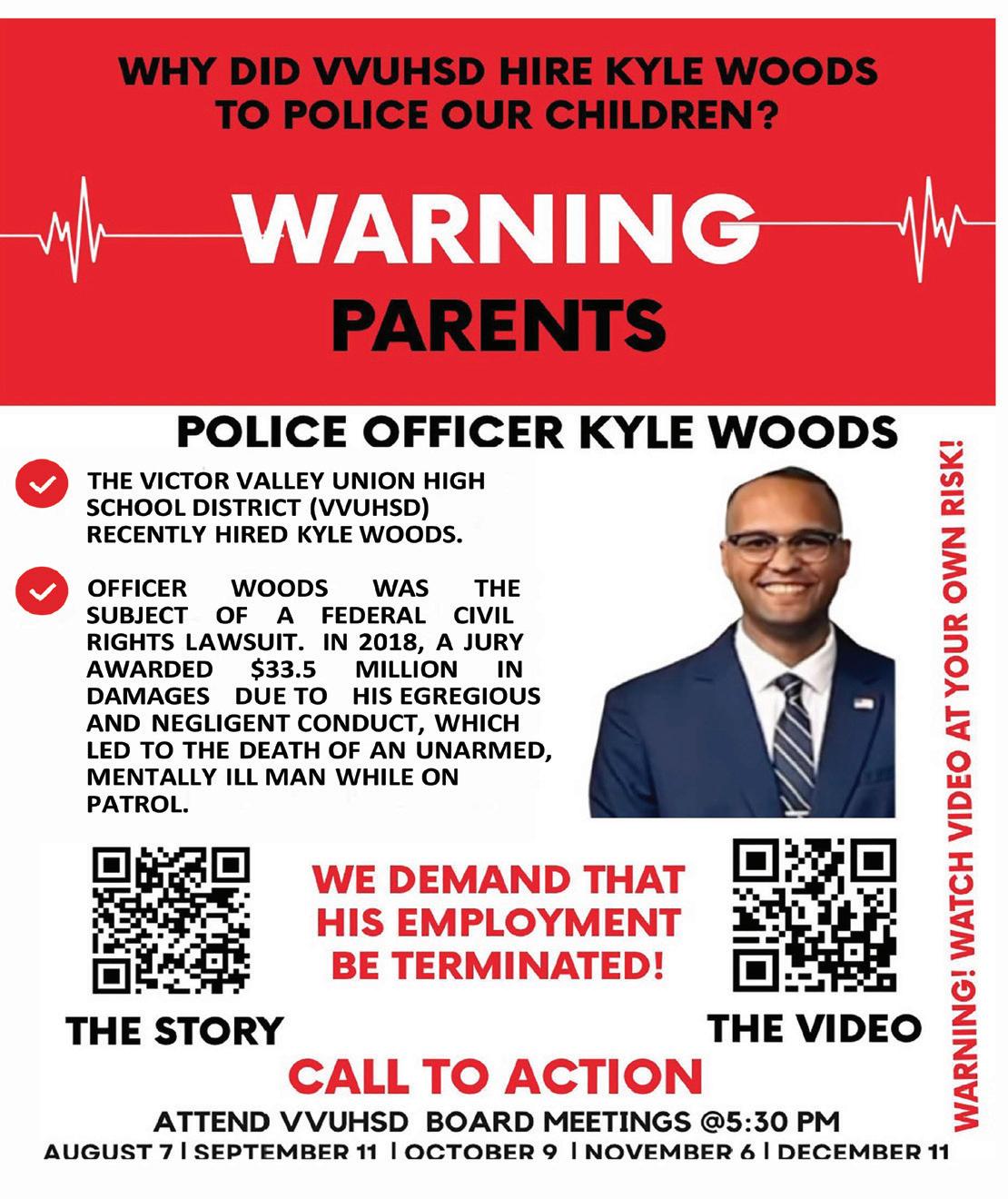
Dear Community Members and Parents;
We are reaching out to share important information regarding a recent hire by the Victor Valley Union High School District (VVUHSD). The district has employed Officer Kyle Woods, who was previously involved in a fatal police shooting in Barstow, California. This incident resulted in a federal civil rights lawsuit, and a jury awarded $33.5 million in damages due to his egregious and negligent conduct, which led to the death of an unarmed, mentally ill man during a patrol.
Attached to this email is a flyer intended to inform and alert parents about the potential risks posed by this officer’s presence on VVUHSD campuses. We kindly ask that you do not distribute this flyer directly to students. Instead, we encourage you to share it with parents or guardians, allowing them to decide how best to address this matter with their children.
We also invite you to express their concerns directly to the VVUHSD School Board. Community members are encouraged to speak at upcoming board meetings or to submit written letters to ensure their voices are heard regarding the safety of our children and the decisions being made by the district. The dates for upcoming board meetings are posted on the flyer.
Thank you for your continued support and commitment to student safety and community accountability.
Sincerely, Phyllis K Morris-Green, Chair, Reimagine Our Communities

























































































































































































President Donald Trump participates in a press conference with departing DOGE adviser Elon Musk, Friday, May 30, 2025, in the Oval Office. (Official White House Photo by Molly Riley) (Wikimedia Commons / Photo by The White House)








Black Woman Who Never Had A Teacher Of Color Is Now An Educator Herself That Trains How To Help Black Children Thrive

Nationwide -- For generations, Black children have been handed books that ignore their brilliance, rewrite their stories, and silence their voices. Joyce Caraway, a dedicated classroom teacher in Dallas, Texas, the author of four children’s books, and the visionary founder of Joybird’s Treehouse, is working to change that, one culturally affirming literacy tool at a time.
On Monday, June 30th at 11am EST/ 8am PST, she will host a free webinar on Zoom for parents and other educators nationwide titled “Master the Grade: Keys to Academic Success & Promotion,” a session designed specifically to help parents of Black children unlock practical strategies that lead to real classroom success and grade promotion.
“I created what I never had—literacy resources where Black kids see themselves, their families, and their future,” says Caraway. Inspired by her grandmother, lovingly called “Joybird” in her youth, Caraway turned a legacy of love into a life’s mission—not just to educate, but to empower. Through Joybird’s Treehouse, she provides pre-K to high school students with culturally relevant stories and writing tools to build confidence, deepen comprehension, and boost academic performance.
Black Woman Who Never Had A Teacher Of Color Is Now An Educator Herself That Trains How To Help Black Children Thrive...continued
Register online: https://zoom.us/meeting/register/ QKGe5DZ7QDypup9HqNrWwQ#/ onhttpzoomusmeetingregisterQKGe5DZ7QDypup9HqNrWwQ#/
About the Founder: Joyce Caraway is a veteran classroom teacher, literacy advocate, and cultural curator. Her platform, Joybird’s Treehouse, fuses academics with cultural pride to uplift Black youth in and beyond the classroom. Her long-term vision includes launching a micro-school and community learning hub to serve as a national model of Black educational excellence. To learn about Joyce, her webinar, and her children’s books, visit https:// linktr.ee/joybirdstreehouse
Youth Summer Music Camp scheduled for July 13-17
A summer music camp opportunity for musicians aged 12-18!

a.m. - 5:00 p.m.
• Wednesday, July 16, 9:00
a.m. - 9:00 p.m. (includes chamber concert)
• Thursday, July 17, 9:00
a.m. - 9:00 p.m. (includes orchestra concert)


A Literacy Platform Rooted in Black Excellence
Unlike traditional systems that often overlook Black youth, Joybird’s Treehouse centers identity, heritage, and joy at the heart of learning. Her debut book, Someone Like Me, has already inspired hundreds of students to rediscover a love for reading—and themselves.
Parents across the country are seeing results:
• Increased classroom participation
• Improved reading and writing scores
• Grade-level promotion and beyond
• Greater confidence and motivation to succeed
Now, Caraway invites families, educators, and community leaders to join her for this live, interactive webinar and learn how to support Black children with resources that reflect their unique identities.
How to Attend the Free Webinar
Master the Grade: Keys to Academic Success & Promotion
Monday, June 30, 2025 at 11am EST/ 8am PST For parents, caregivers & educators of Black children (Pre-K–12th)
Through a partnership between the San Bernardino Symphony Orchestra (SBSO) Association, California State University San Bernardino's Summer Youth Music Camp is bringing middle-school and high-school students to the CSUSB campus for a week-long series of rehearsals, coachings, sectionals, and masterclasses. Participating student musicians will be taught by a faculty of professional musicians from both CSUSB and the San Bernardino Symphony Orchestra.
This camp is open to woodwind, brass, percussion, keyboard, and string students who are 12-18 years old by Sunday, July 13, 2025, or who have just finished high school. Students must have at least two years of playing experience. Camp will convene on the following dates:
• Sunday, July 13, 12:005:00 p.m. Monday, July 14, 9:00
a.m. - 5:00 p.m. Tuesday, July 15, 9:00
The focus of this camp is symphonic orchestra and chamber music performance. All qualified registrants will be accepted, but to be considered for camp orchestra and chamber group placement, students are asked to submit a YouTube link of themselves playing one piece, or an excerpt of a piece (can be solo, chamber, or orchestral), that best represents their current playing level.
Registration includes tuition for the camp, lunch Sunday through Thursday, dinner on Sunday and Thursday, and a camp t-shirt. The fee for this five-day intensive is $200 + the Purple Pass processing fee. To register, please fill out the three forms and complete tuition processing, all on the summer camp website: https://www.csusb. edu/music/summer-programs Registration paperwork, student YouTube, and payment all must be received by July 1, 2025.
Questions may be directed to Dr. Lucy Lewis at lucy.lewis@csusb. edu.

